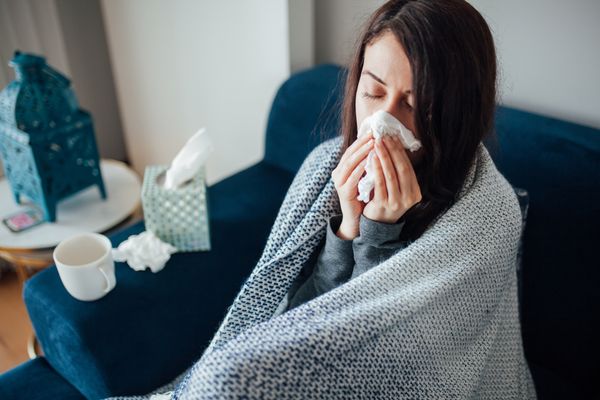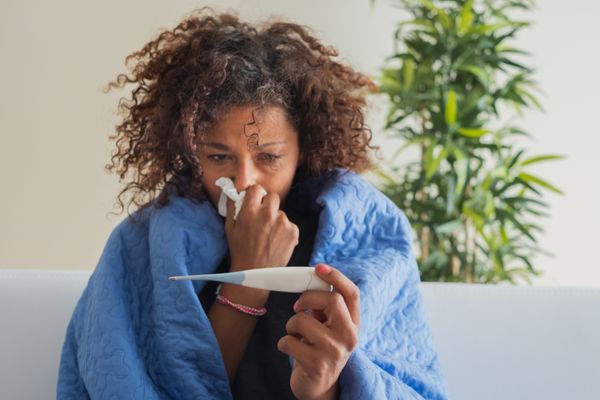The good news: This awful flu season has just about peaked and may be heading on its way out.
The bad news: It's not over. There will still be cases of the flu, because the virus will likely continue to circulate through April or even May.
And while it's a good thing to see that the weekly rate of hospitalizations and deaths from influenza are declining, it's still important to be armed with some knowledge just in case you—or someone you know—comes down with the nasty bug that doesn't seem to want to quit.
It may be a severe season, but that doesn't mean you can't get through it. And let's all hope that next year's season is a lot kinder!
You can still get your vaccine. Although it's best to get it as soon as it's available—usually around September—it can still offer protection for the rest of the flu season if you get it now. Sadly, this year's vaccine is only about 25 percent effective against influenza A and 42 percent against influenza B, with an overall protection of about 48 percent—but that's still better than nothing. And if you do come down with the flu, chances are it will be a milder case than without the vaccine. Keep in mind it takes about two weeks for the vaccine to become fully effective. Not sure where to get the vaccine? Check in with your health care provider, supermarket, pharmacy, community group or center, and some school and university health clinics.
Practice good hygiene. Of course, it's best that you don't catch the flu at all. To help lower your risk, make sure you frequently wash your hands with soap and water and avoid touching items in public places. And don't be afraid of being antisocial: Avoid close contact with people who are sick, as well as close contact with your eyes, nose or mouth.
Forgo antibiotics. They are ineffective against the flu. That's because the flu is a virus, and not a bacterial infection (unless, of course, you come down with a secondary infection caused by the flu, like pneumonia, bronchitis, sinus infections or ear infections). The overuse of antibiotics (which treat bacterial but not viral infections) is a problem because it can promote antibiotic resistance. The Centers for Disease Control and Prevention reports that up to one-third to one-half of antibiotic use is either unnecessary or inappropriate. Antibiotic resistance occurs when the bacteria in your body change in response to the use of antibiotics, so the antibiotics are no longer effective against the bacteria.
Ease aches and fever with these over-the-counter drugs. Acetaminophen (Tylenol), ibuprofen (Advil) and naproxen (Aleve) can help with aches and fever that come with the territory. But exercise caution: Taking more than the daily suggested maximum amount of acetaminophen may be harmful to your liver; ibuprofen and naproxen (types of nonsteroidal anti-inflammatories, or NSAIDs) may cause intestinal bleeding and increase the risk of kidney damage or a heart attack if taken improperly. If you take acetaminophen, stay away from alcohol. And if you're on a blood thinner like warfarin (Coumadin) or clopidogrel (Plavix), use caution when taking NSAIDs because your risk of bleeding may be increased. Also, read labels carefully to avoid doubling up on active ingredients. For example, some cough and cold medications contain acetaminophen, so you must watch your maximum dose of acetaminophen.
Cool off. If you'd rather forgo medicine—or add another helper—a cool compress or sponge bath can cool a fever. And remember that a fever is not necessarily a bad thing in an otherwise healthy person. It's a sign your body is fighting to recover. The Mayo Clinic advises rest and plenty of fluids for fevers up to 102 degrees Fahrenheit, and it says that no medicine is needed (unless you're uncomfortable). If the fever is accompanied by a severe headache, stiff neck, shortness of breath or other unusual signs or symptoms, be sure to contact your health care professional.
Treat stuffiness with these. If you just can't stand the congestion, nasal sprays, menthol rubs, expectorants (for coughing), antihistamines and decongestants can help clear your nasals passages. But be aware that there may be downsides—like nausea, skin irritation, insomnia, anxiety and a worsening of the stuffiness (if nasal spray is used for more than three days). You might want to consider using a neti pot, nasal irrigation, a cool-mist humidifier or steam inhalation instead.
Turn to nutrition. Honey soothes your throat and can help ease coughs. And that old-fashioned remedy, chicken soup, is for real: it can ease congestion, sore throats and coughs and may even inhibit the activity of white blood cells responsible for the body's inflammatory response that triggers your aches and pains. Gargling with salt mixed with warm water (use about one teaspoon per 8-ounce glass) can help reduce the swelling in your throat, loosen mucus and flush out the bad stuff.
More Reading:
How to Avoid Catching the Flu
The Flu: What You Need to Know







